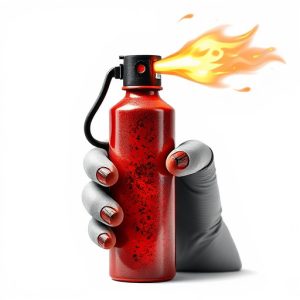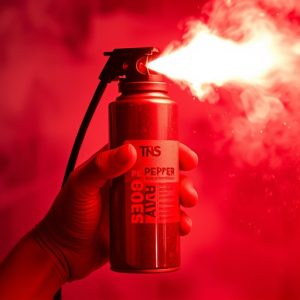Is Pepper Spray Flammable? Safety, Chemistry, and Legal Insights
Pepper sprays containing oleoresin capsicum (OC) can be flammable due to their organic composition,…….
Pepper sprays containing oleoresin capsicum (OC) can be flammable due to their organic composition, which includes volatile capsaicinoids. This characteristic requires users to handle the spray with care, adhering to safety protocols that include proper storage and usage to prevent accidental fires and ensure safe and effective use in self-defense situations. The risk of ignition is particularly high when fine particles become airborne and encounter a heat source. It's crucial for users to be aware of the flammability of pepper spray, as it influences both safety and legal compliance. Understanding that some pepper sprays are indeed flammable is essential for responsible ownership, emphasizing the importance of careful handling to maintain the integrity of the product and protect against unintended fires or burns. Users should always be mindful of local regulations regarding the use of pepper spray and take the necessary steps to store and use it safely.
When it comes to personal safety, pepper spray is a commonly recognized deterrent, yet questions remain about its properties. A prevalent query in safety circles is whether pepper spray can ignite—is pepper spray flammable? This article delves into the chemistry that makes certain pepper sprays combustible under specific conditions and what this means for end users. We’ll explore the safety and legal considerations of using flammable pepper spray, including its potential risks and how to handle it responsibly. Additionally, we’ll provide practical advice for those who use or carry pepper spray, ensuring they are well-informed about the product’s nature and its implications for personal defense. Understanding these aspects is crucial for anyone considering pepper spray as a part of their safety arsenal.
Understanding the Chemistry Behind Pepper Spray and Its Flammability
Capacity for combustion inherent in certain compounds within pepper spray contributes to its classification as flammable. The primary active ingredient in pepper sprays is oleoresin capsicum (OC), a mixture of various capsaicinoids responsible for the pungent sensation associated with the spray. This oil-based solution, when vaporized under high heat or an open flame, can ignite due to its organic composition. The volatile nature of the OC compound is a critical factor in its flammability. Understanding the chemistry behind pepper spray is essential for both safety during use and the handling of the product post-deployment. When subjected to ignition sources, the fine particles of capsaicinoids can catch fire, leading to potential risks that users must be aware of. Safety protocols and training are imperative to mitigate these dangers, ensuring that pepper spray is used responsibly and effectively in self-defense situations. Additionally, the flammability aspect necessitates stringent storage regulations to prevent accidental fires. The interaction of chemical compounds within the pepper spray and their reaction to heat sources must be carefully considered to ensure user and bystander safety.
The Safety and Legal Implications of Using Flammable Pepper Spray
The use of flammable pepper spray necessitates a thorough understanding of its safety and legal implications. Pepper spray, a widely recognized self-defense tool, contains oleoresin capsicum (OC), which induces intense irritation upon contact with mucous membranes. While the effectiveness of pepper spray as a non-lethal defense mechanism is well-documented, its flammable nature introduces additional risks that users must consider. When exposed to an open flame or certain types of electrical discharges, the spray can ignite, posing both a fire hazard and a risk of causing severe burns.
Safety protocols are paramount when handling such a substance. Users should be aware that storing flammable pepper spray in close proximity to heat sources or ignition points is inherently dangerous. Manufacturers often provide guidelines on how to store, use, and dispose of these products safely to mitigate the risks associated with their flammable properties. Legally, there are stringent regulations governing the possession, use, and transportation of pepper spray, which vary by jurisdiction. It is imperative for individuals to familiarize themselves with local laws to avoid legal repercussions that could arise from misuse or improper handling of flammable self-defense sprays. Understanding the “is pepper spray flammable” aspect is crucial for responsible ownership and use, ensuring both personal safety and compliance with the law.
Practical Considerations for Those Who Use or Carry Pepper Spray
When integrating pepper spray into personal defense strategies, understanding its properties and limitations is crucial for safety and efficacy. Pepper spray, a non-lethal self-defense tool, contains oleoresin capsicum (OC), which induces an intense burning sensation upon contact with mucous membranes. It’s commonly used by law enforcement and individuals alike for deterrence against assailants. However, one practical consideration that merits attention is whether pepper spray can be ignited or is flammable. The question of “Is pepper spray flammable?” is pertinent because the chemical composition of the spray can react to heat sources or open flames. While it’s not inherently flammable like gasoline, caution should be exercised around fire as the presence of aerosol propellants increases the risk of ignition if directly exposed to flame or extreme heat. Users and carriers of pepper spray should keep their sprays away from heat sources and open flames to prevent any unintended combustion that could compromise their safety or the integrity of the canister. Proper storage, handling, and awareness of its flammable characteristics are essential for those who rely on pepper spray as a means of self-defense to ensure it is ready for use when needed most. Additionally, environmental conditions such as high temperatures can affect the shelf life and pressure within the canister, potentially impacting the performance of the spray. Users should regularly inspect their pepper spray units for any signs of damage or leakage, especially after exposure to extreme heat, to guarantee reliability in critical moments.

